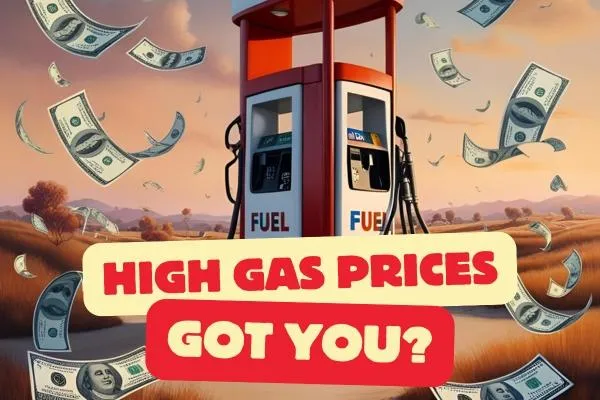
Swap a Car or Keep It? How to Decide if a Fuel-Efficient Upgrade Is Worth It
Table of Contents
The Emotional vs. Financial Debate: Is It Really Time to Trade Up?
The Real Math Behind a Car Swap
1. Calculate the True Cost of the New Car
2. How Much Is Your Current Car Worth?
3. Don’t Forget the Hidden Costs
When Swapping Your Car Does Make Sense
With gas prices through the roof, it’s tempting to wonder if now is the perfect time to swap a car for something more fuel efficient. After all, driving a gas-guzzler that barely delivers 17 miles per gallon can feel like pouring money straight into the fuel tank. That shiny hybrid or sleek electric vehicle offering 50+ miles per gallon—or better yet, no gas at all—might look pretty irresistible.
But before you rush out to browse vehicle swap programs or check out the latest fuel-efficient car models, take a deep breath. It’s not always as simple—or as financially wise—as it seems.
💸 The Emotional vs. Financial Debate: Is It Really Time to Trade Up?
It’s easy to get excited about the money you think you’ll save when you upgrade. Just imagine all the vacations, dinners out, or extra cash you could enjoy by cutting your gas expenses.
But hold on—are you really saving, or just replacing one cost with another?
If you’re currently driving a paid-off vehicle, even if it’s not winning any awards for fuel efficiency, the financial benefits of keeping it might outweigh the flashy promise of better gas mileage.
📊 The Real Math Behind a Car Swap
Before you start searching for the best car trade-in options, let’s crunch the numbers and see if it’s truly worth it.
1. Calculate the True Cost of the New Car
How much will this new, more fuel-efficient car actually cost you? That higher gas mileage comparison isn’t free.
Example: Let’s say you’re eyeing a 2019 Toyota Prius with a price tag of $15,000.
2. How Much Is Your Current Car Worth?
If you plan to sell or trade it, that value offsets the cost of your new vehicle.
Maybe you’re selling your 2008 Ford F-150, which is paid off and worth about $5,000. That leaves you with $10,000 still to cover.
3. Don’t Forget the Hidden Costs
Sales Tax: $600 at purchase
Insurance Increase: $50/month (newer cars often cost more to insure)
Registration Fees: Likely higher; estimate an extra $100 per year
Loan Payments: A $10,000 loan over 4 years at 7% means $240/month
Opportunity Cost: Paying in cash? That’s money you’re not investing. Assume a 10% annual return loss on $10,600 (car + tax) = $1,060/year or about $88/month
👉 Total Added Monthly Expenses:
$50 (insurance) + $8 (registration) + $240 (loan) = $298/month, not counting opportunity cost.
4. Calculate Fuel Savings
Prius: 1,000 miles/month ÷ 50 mpg × $3.50/gallon = $70 fuel cost
F-150: 1,000 miles/month ÷ 20 mpg × $3.50/gallon = $175 fuel cost
Savings: You’d save $105/month on gas.
5. So, Is It Worth It?
With these numbers, you’d be spending an extra $298/month in new costs to save $105/month in gas. That’s a negative cash flow of nearly $200 each month.
Unless you’re driving significantly more miles or scoring a killer deal on a used hybrid or electric vehicle upgrade, the math simply doesn’t support making the switch—at least not from a purely financial perspective.
🚗 When Swapping Your Car Does Make Sense
Despite the math, sometimes a car swap is a smart move:
✅ Your current vehicle requires constant repairs and maintenance.
✅ You drive significantly more than 1,000 miles per month.
✅ You qualify for auto swap deals with incentives or rebates.
✅ You’re moving toward a more sustainable lifestyle and willing to accept a longer-term ROI.
✅ You’re trading up for a hybrid or electric vehicle with significantly lower maintenance costs.
If these apply, swapping could help you reduce fuel expenses and potentially boost your vehicle’s resale value down the line.
🛠 How to Maximize Value If You Do Swap a Car
Look for High Cash-Back Trade-In Programs
Some manufacturers offer bonuses when you trade in an older, less-efficient vehicle.
Take Advantage of Government Incentives
If you’re upgrading to a hybrid or electric vehicle, check for tax credits and rebates.
Negotiate Like a Pro
Don’t settle for the first trade-in offer. Compare car depreciation value calculators and use that data in negotiations.
Consider Certified Pre-Owned Vehicles
You can often get better deals on low-mileage, fuel-efficient vehicles without the hefty new-car price tag.
Final Thoughts: Should You Swap a Car or Keep It?
Ultimately, the decision comes down to one question: Are you swapping for emotional satisfaction or genuine financial benefit?
If the goal is to save money on gas and reduce monthly expenses, keeping your current car might be the smarter play—especially if it’s paid off and still reliable. But if you’re factoring in environmental concerns, reliability issues, or long-term maintenance costs, a swap might make sense even if it doesn’t immediately put money back in your pocket.
Want to Avoid Costly Financial Mistakes Like Overpaying for a Car?
Grab your FREE copy of “Top 18 Ways to Throw Away Your Money—And What You Can Do Instead...” and learn how to make smarter decisions with every dollar you spend.